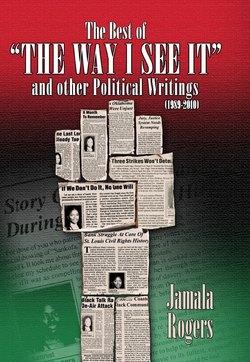Читать книгу The Best of "The Way I See It" and Other Political Writings (1989-2010) - Jamala Rogers - Страница 3
На сайте Литреса книга снята с продажи.
ОглавлениеIntroduction
Most people who know Jamala Rogers - especially her mother - would not be surprised as to how she became a featured columnist for the award-winning St. Louis American.
The story goes that Jamala approached publisher Donald Suggs in 1994 and asked in a very direct manner why there were only men whose political views were worthy of print in the newspaper. She had known “Doc” for many years and knew that the publisher would take her concern seriously.
Dr. Donald Suggs and Jamala Rogers participated as
panelists at an unknown event. (c. late 1980’s)
Dr. Suggs invited Jamala to fill that void. She had not raised the observation to take on the task; after all, she had just reluctantly accepted a position in the administration of the City’s first African American mayor. Setting up the Office of Youth Development for Mayor Freeman Bosley, Jr. was going to be challenge enough.
However, Jamala eventually accepted the invitation to join the St. Louis American. And the rest is history.
Jamala joined Shirley Deavens, already a mainstay with her religious column, Living the Abundant Life. They opened the door for other columns by women. At one point, there were seven African American women simultaneously expressing their views about life, love and struggles in the award-winning St. Louis American.
Jamala’s commentaries were most consistently printed in the St. Louis American but they also appeared in many other publications. In 2006, she joined the editorial board of BlackCommentator, a weekly online publication. Regardless of where they are published, Jamala’s articles make their way into everyday conversations, onto the airwaves of talk radio, into the lesson plans of classrooms, and onto the bulletin boards of workplaces. The power of her words, the clarity of her analysis and the passion of her purpose has been embraced and debated for almost thirty years.
Those in power often feel the sting of her words when they trample on the rights, aspirations and dignity of working people, especially children and youth. Some are compelled to defend themselves as did the mayor to Jamala’s critique on Why the City Sales Tax Lost or the Catholic official to The Injustice by the Catholic Church.
In most instances, her readers believe that she speaks with them and through them - understanding their feelings of hopelessness, joy, fear and accomplishment. They often share their stories with Jamala about how they found their voice or how they confronted an abuse of power. This is exactly why Jamala writes. She wants people to read more and write more. More importantly, she wants them to better understand the world in which they live, and that desperately needs their help for a complete and total transformation.
The selection of articles for this book is a combination of reader favorites and those that document significant events or struggles. Some titles may differ from their original published titles. Articles are from the St. Louis American unless noted otherwise.
